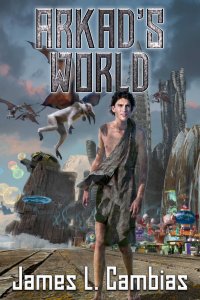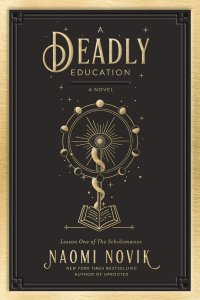Paul Di Filippo Reviews Arkad’s World by James Cambias
 Arkad’s World, James Cambias (Baen 978-1-4814-8370-4, $24, 304pp, hardcover, January 2019)
Arkad’s World, James Cambias (Baen 978-1-4814-8370-4, $24, 304pp, hardcover, January 2019)
One of my all-time favorite SF novels is Earthblood, by Keith Laumer and Rosel George Brown. It’s a space operatic quest following the life of a man called Roan, from youth to maturity. He’s the only human, and despised, in a galaxy of oddball aliens, and he’s determined to find the rest of his species on the legendary Earth, even though no one knows where that mythical planet lies. Laumer’s talents for action and the ethics of heroism and brute survivialism are modulated by Brown’s empathy, poetry, intimacy and humor. I first read the book as a teen, and was hesitant to return to it as an adult, lest it have inexplicably degenerated into a pale imitation of what I recalled. But I read it a few years ago, and can report with joy that it remains a minor masterpiece.
The trope of a lone, beleaguered human adrift in an uncaring or indifferent galaxy also came into play–at least partially, if memory serves–in a couple of Heinlein’s books: Have Space Suit–Will Travel and Citizen of the Galaxy. The potency of the trope is dangerous, however, as it can lead, if handled clumsily, to a kind of whiny self-pity on the protagonist’s part, and also the subtextual or overt expression of prejudice against all the hostile or uncaring aliens.
But James Cambias is much too fine and clever a writer to fall into those traps. And so his deployment of the trope in his newest book brings us nothing but an honest and pleasurable sense of identification with the hero’s plight; a gosh-wow delight at the crazy milieu the hero must traverse; and feelings of suspense and wonderment centered on how he will succeed at his quest–if he even does. Moreover, Cambias has some fine speculations on matters ranging from modes of government to artificial ecosystems.
The year is 2211, and we are on the planet Syavusa, a kind of Switzerland or Casablanca among the other polities in a teeming galaxy.
Exiles fled to Syavusa from all over, because there was nobody to keep them away. Nobody ruled Syavusa. Yet somehow no conquerors ever came, no interstellar powers claimed the world. Arkad didn’t know why, and didn’t really wonder about it.
The other bit of backstory you need to know is that Earth was invaded some years ago by the Elmisthorn, who have taken to culling that planet’s population, while scattering remnant human refugees around the galaxy.
Our hero, Arkad, as mentioned, is the lone human in the city of Ayaviz. Subsisting at the bottom of many heaps, he lives a grim but not entirely unhappy life by his wits and daring. He has friends among all three main alien races, the Pfifu, the Itooti, and the Vziim, knowing their languages and customs.
On one seemingly ordinary day, Arkad learns of the miraculous presence of three other humans in the city. He makes contact. They are Jacob, the leader, a woman named Ree–both normal humans–and the most oddball Baichi, who is a cell-by-cell blend of nanomachines and biological parts, created by the Elmisthorn but now a renegade. The three are searching for a fabled crashed human ship, the Rosetta. That happens to be the ship that brought Arkad to this world with his mother when he was just a toddler. And now he might be the key to finding the wreck.
All of this setup is laid out with brilliant clarity and maximum allure in a short time. What follows is a kind of Vancian Big Planet-style hegira across Syavusa, full of wonders, dangers, intrigues, treachery, and love. The climax–not too big a spoiler, I hope–is a battle among all the contenders at the wreckage of the Rosetta. Then comes a coda which packs an emotional, existential wallop like the revelations at the end of Crowley’s Engine Summer.
When I reviewed Cambias’s Corsair on this site a couple of years ago, I said, “Cambias has a wicked sense of humor, and despite all the danger and tragedy in the book—which are not minimized—he provides at least one deep laugh per page, especially in the witty dialogue and empathetic characterizations.” All of this has been ported over to the new book. But the nature of the humor is a tad different, since it relies on the bizarre cultural disjunctions among all the races, and is conveyed in the gleefully whacked pidgin talk that Cambias has invented. As for the characterizations, Arkad and the others are richly compacted and layered, and such matters as the fate of Jacob and the improbable love affair between Arkad and Baichi are highly resonant. The offstage backstory looms large, and seems to offer, along with the book’s open-endedness, room for further adventures. Also enjoyable are the references to past classics of such quest lore, such as The Hobbit–known believably by Arkad through a primer-type device (cue Neal Stephenson’s The Diamond Age).
This is a book which moves incredibly swiftly from one hair-raising moment to another. Cambias manages to squeeze a Wolfean tapestry of places and actors and events into a relatively small compass. We even pass through a small war. But there are reflective moments as well, on the nature of art and culture, the value of friendship, and the choice of honor versus deceit. Finally, there’s a big kicker along techno-lines that Karl Schroeder might have imagined, about the nature of Syavusa itself.
Besides being part of the “lone human in the galaxy” tradition, this novel also occupies a small category of books titled So-and-so’s World. Think of Vinge’s Tatja Grimm’s World, Le Guin’s Rocannon’s World, Duane’s Spock’s World. (Dare we also include Malzberg’s Herovit’s World?) The focus is usually on exploration of a unique venue through the eyes of a native. (Of course, this trope is also deployed in books without this style of title.) It’s a nicely delimited remit for a novelist, and Cambias has given us an exemplary instance for future writers to study.
A figure in the tale who must remain nameless in my review tells Arkad: “Ah, Arkad, I will miss having you here. Such endless self-confidence in such a fragile vessel! Even if you knew the truth, your courage would be undiminished. It’s your most appealing trait.”
These words might be equally applied to Cambias’s deft, self-confident and generous storytelling prowess.
 While you are here, please take a moment to support Locus with a one-time or recurring donation. We rely on reader donations to keep the magazine and site going, and would like to keep the site paywall free, but WE NEED YOUR FINANCIAL SUPPORT to continue quality coverage of the science fiction and fantasy field.
While you are here, please take a moment to support Locus with a one-time or recurring donation. We rely on reader donations to keep the magazine and site going, and would like to keep the site paywall free, but WE NEED YOUR FINANCIAL SUPPORT to continue quality coverage of the science fiction and fantasy field.







